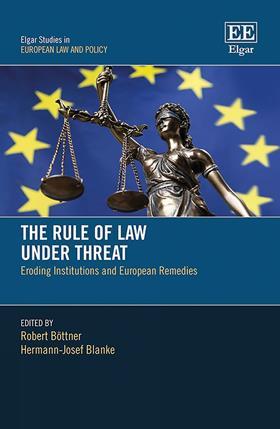The Rule of Law Under Threat: Eroding Institutions and European Remedies
Robert Böttner and Hermann-Josef Blanke
£105, Edward Elgar
★★★★✩
Few terms carry as much potential for disagreement as ‘rule of law’. Everyone agrees it is somehow fundamental, but beyond that it is difficult to find consensus. This collection of essays explores perceived threats to the rule of law in the EU. The book takes as a starting point a substantive definition, drawn from case law and statements by various institutions, which understands the rule of law as including the principles of legality and legal certainty; the prohibition of arbitrary exercise of power by the executive; independent and impartial courts; and effective judicial review, extending to respect for fundamental rights and equality before the law.
The book asserts that the rule of law – and citizens’ confidence in it – has eroded in recent years. Particular focus is given to the New States – that is, eastern European states that were behind the iron curtain before 1990, which did not have a history and experience of the kind of rule of law-based government that western European states had. The chapters – which are generally readable, varied and interesting – cover issues such as judicial independence and appointment of judges, and the status of union law in relation to national constitutions. The final part of the book sets out a ‘toolkit’ for the EU theoretically to bring to heel any states that break EU rules.

Many of the essays focus on the right-wing and populist Fidesz government in Hungary, and PiS (Law and Justice Party) rule in Poland which came to an end in 2023.
This, perhaps, reveals an unspoken aspect of discourse invoking the rule of law. The substantive definition, containing an assumption that certain fundamental rights will be protected, is ultimately a short-hand condemnation of populism. In some ways, much of this book is precisely that – an assessment of the risks of populism to the European project. It is one with a pessimistic end. Ultimately, analysis of the ‘toolkit’ seems to conclude that the remedies available to the EU have had limited success.
Imposing sanctions has, it is true, brought Hungary some way onside, but ultimately it was national democracy that ended the PiS government in Poland; the same national democracy that brought it to power in the first place.
An interesting read, if not one for the casual reader.
James E Hurford is a solicitor at the Government Legal Department, London































No comments yet